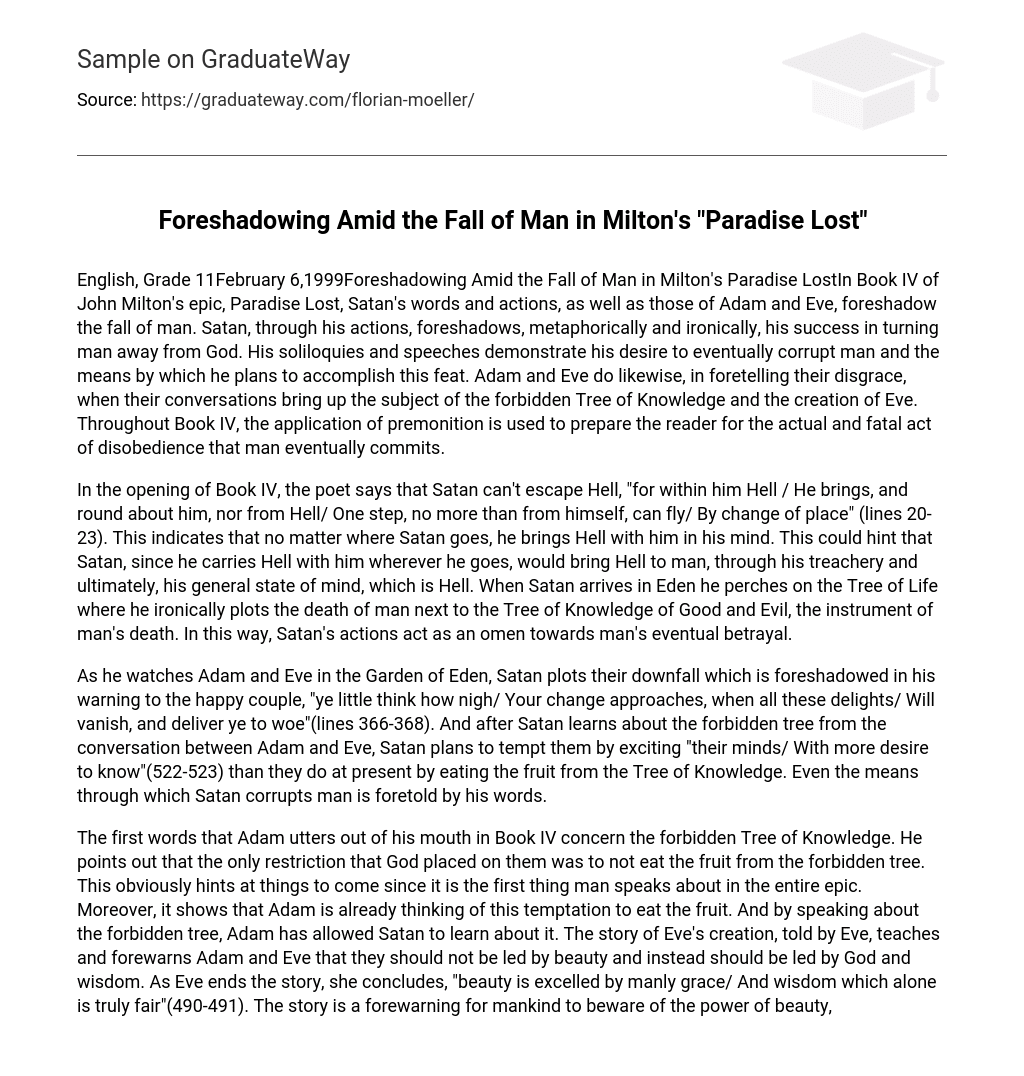Both Satan and Adam and Eve in Book IV of John Milton’s Paradise Lost act as foreshadowing for the eventual fall of man. Satan’s actions, specifically, metaphorically and ironically predict his success in leading man away from God. In his soliloquies and speeches, Satan exposes his longing to corrupt man and outlines a detailed plan for accomplishing this objective.
Adam and Eve also engage in similar actions, predicting their downfall, when they discuss the forbidden Tree of Knowledge and the creation of Eve. In Book IV, premonition is employed consistently to ready the reader for mankind’s eventual and fateful act of disobedience.
The poet states in the opening of Book IV that Satan cannot escape Hell because Hell is within him and surrounds him. He cannot flee from Hell or distance himself from it. This means that wherever Satan goes, he carries Hell within his thoughts.
Satan is said to constantly carry Hell within him, using his deceitful nature and mindset to bring Hell upon man. While perched on the Tree of Life in Eden, Satan cunningly plots the destruction of mankind. This tree is situated next to the Tree of Knowledge of Good and Evil, which will ultimately lead to man’s downfall. Therefore, Satan’s actions foreshadow man’s inevitable betrayal.
Satan observes Adam and Eve in the Garden of Eden, devising a plan to cause their downfall. He warns them that their happiness is temporary and they will soon experience misery. In addition, Satan learns about the forbidden tree’s presence and intends to tempt Adam and Eve by increasing their desire for knowledge. By his words, Satan hints at his strategy to corrupt humanity.
Adam’s initial words in Book IV revolve around the forbidden Tree of Knowledge. He emphasizes that the sole prohibition imposed by God was against consuming the forbidden tree’s fruit. This early mention suggests future events and indicates that Adam is already contemplating the temptation to eat the fruit. Additionally, by discussing the forbidden tree, Adam unwittingly reveals its existence to Satan.
The story of Eve’s creation, as recounted by Eve, serves as a cautionary tale for Adam and Eve, emphasizing the importance of not being swayed by outward appearance but instead following God and pursuing wisdom. As Eve concludes the story, she highlights that true beauty lies in masculine grace and wisdom (490-491). This narrative serves as a warning to humanity about the potential dangers of succumbing to the allure of beauty, a warning that ultimately goes unheeded by Adam. Tempted by Eve’s beauty, Adam chooses to reject God and wisdom. This implicit warning foreshadows and predicts mankind’s future disobedience.
Paradise Lost focuses on man’s decline from grace. Throughout Book IV of Milton’s epic, the downfall of man is anticipated through the words and deeds of Satan, as well as Adam and Eve. Ultimately, the poet himself predicts the fall after mentioning “wedded love,” conveying, “Sleep on, / Blessed couple, and, oh! even happier if you do not desire a greater state and are content with your current knowledge.”





